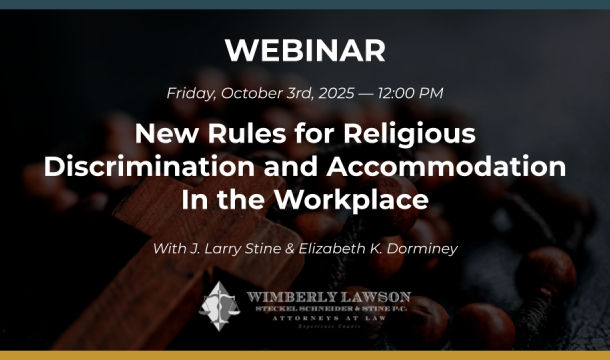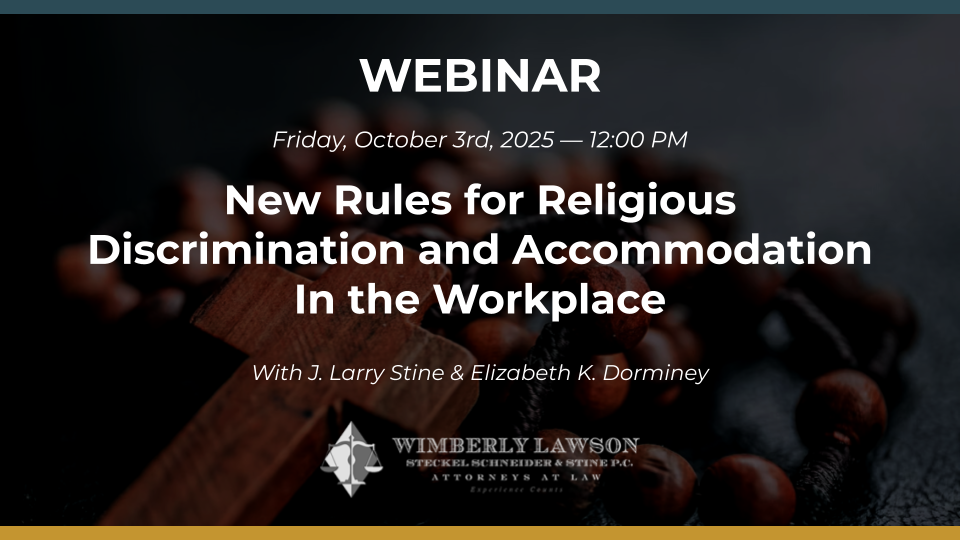Sexual Harassment Doesn’t Have to Be Overtly Sexual
An employer can be legally responsible for harassment against its employees by other employees—and third parties, such as customers. That means that an employer needs to take prompt, effective remedial action if it is aware that one of its employees is being sexually harassed by a customer. Costco recently learned this lesson in the form of a $250,000 jury verdict rendered in favor a former employee who claimed that she was sexually harassed and stalked by a Costco customer. That verdict was upheld by the 7th Circuit Court of Appeals this week. (EEOC v. Costco Wholesale Corp. , 7th Cir., Nos. 17-2432 & 17-2454, 9/10/18). The 7th Circuit's written decision reminds us that conduct that is not overtly sexual may nevertheless meet the legal definition of sexual harassment and trigger a duty by the employer to address it.
Dawn Suppo, an employee of Costco, was stalked by Thad Thompson, a customer of Costco, for over a year. Things got so bad that Suppo secured a plenary no-contact order from an Illinois state court. Traumatized by the experience, she also took an unpaid medical leave, and when she didn't come back, Costco terminated her employment. The Equal Employment Opportunity Commission (EEOC) sued Costco on Suppo's behalf, alleging that Costco had subjected her to a hostile work environment by tolerating Thompson's harassment. The case went to trial, resulting in the $250,000 verdict in the EEOC's favor.
Costco challenged the verdict on the ground that the Thompson's conduct was not severe or pervasive enough to rise to the level of hostile environment sexual harassment. Thompson's comments were not overtly sexual; he asked (often repeatedly) where she was from, what her nationality was, where else she worked, where else she went, where she lived, what else she did, if she had a boyfriend, which male employees she spoke to, and the identity of a man she shopped with. On various occasions, he told her she was "pretty," "beautiful," and "exotic." He asked how old she was. He tried to give her his business card on one occasion (pushing it into her hand "two, three, and four times"), asked her out on dates approximately six times, and "constantly" tried to give her his phone number. He also closely observed her appearance: For example, on a day that he saw her twice, he "noticed that she had obviously powdered her face" between the first and second times that he saw her. On another occasion, he noticed that her eye makeup had been applied unevenly.
There was also some physical contact, but it was not overtly sexually suggestive either. Thompson used his shopping cart to bump into Suppo or her cart four times. He touched her twice: On one occasion, Thompson touched her face under her eye, noting some darkness. On another, he touched her wrist, commenting on her veins and a sore on her hand that was healing slowly. Thompson also attempted unsuccessfully to hug Suppo twice.
The 7th Circuit acknowledged that Thompson's conduct was not as egregious as the sexually harassing conduct described in some of its other decisions. However, the Court pointed out that conduct does not have to be overtly sexual in order to be actionable; the alleged harassment must occur because of the plaintiff's sex. But it need not consist of pressure for sex, intimate touching, or a barrage of deeply offensive sexual comments. Actionable discrimination can take other forms, such as demeaning, ostracizing, or even terrorizing the victim because of her sex. Severity and pervasiveness must be judged by "the totality of the circumstances".
Because Thompson's talking and touching took place in the context of his stalking of Suppo, it rose to the level of actionable sexual harassment.
Pro tip: If an employee complains that someone—another employee, a manager, or a third party—is making her/him uncomfortable, the employer needs to look into the matter, even if the conduct complained of is not overtly sexual.

Kathleen J. Jennings is a former principal in the Atlanta office of Wimberly, Lawson, Steckel, Schneider, & Stine, P.C. She defends employers in employment matters, such as sexual harassment, discrimination, Wage and Hour, OSHA, restrictive covenants, and other employment litigation and provides training and counseling to employers in employment matters.
Related Content
Get Email Updates
Recent Content

Trump Nominates Appointments to NLRB and EEOC but Policy Changes Likely to Be Delayed

DOL Launches Self-Audit Programs Designed to Help Employers Improve Compliance

DOL Must Release EEO-1 Reports to the Public under Open Records Laws

Current Advice on Active-Shooter Situations

New Policy for Federal Workers and Religious Expressions

